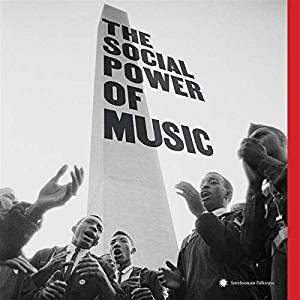
The Social Power of Music
Smithsonian Folkways Records
I remember a radio station that used the tag line, “music of your life.” The station was an easy-listening station that played what we called, “dentist office music. “ As a kid, we made fun of the easy listening music. But you know, all of the stations up and down the radio dial were (and are) the music of someone’s life. Even if you’re not a music fan, music informs everything all aspects of our lives. From the chanting along to “Rock and Roll part 2” at football games, singing hymns at church, standing (or kneeling) for the national anthem or doing the electric slide, music is everywhere. We sing when were happy, we sing when we’re mad, and we sing just for the hell of it. Smithsonian Folkways Records have put together this ambitious four CD compilation that explores the many ways music functions in our lives.
The Social Power of Music looks at how music binds us together in different ways. Culling tunes from Folkways Records extensive achieves along with tunes from other ephemeral independent labels, the collection is a journey across decades and visits many communities. The first three discs primarily focus on the American experience. The first disc is called “Songs of Struggle”. The songs on this disc are a cross section of social movements from the 20th Century. Broadly speaking, these are protest songs. The second disc is called “Sacred Sounds” and brings together songs of worship and praise. Disc three is called “Social Songs and Gatherings”. These are the songs that bring people together in joy and sorrow, from the dance hall to the graveside. The fourth disc, “Global Movements” focuses on songs of protest and liberation from around the world.
The labor organizer, Joe Hill is credited with saying that “a pamphlet, not matter how good is never read more than once, but a song is learned by heart and repeated over and over.” The Songs Of Struggle collection has some of those songs that have been repeated over and over. Some are clearly tied to a specific cause; others have become part of the American vernacular. Most of us learned “This Land Is Your Land” in grade school music class as a simple to sing patriotic tune. When you hear Woody Guthrie singing all the verses, you clearly hear the song is really about inequality. Pete Seeger’s “If I Had A Hammer” and Bob Dylan’s “Blowing in the Wind” have similarly become a part of our shared experience while having roots as protest songs.
Some the tunes are joyous expressions of protest. Bobbie McGee’s rendition of “Union Maid” makes you want to sing along and take pride in being a union member. Country Joe McDonald’s “I Feel Like I’m Fixin’ To Die”, pokes fun at the absurdities of war while still making the point that young people are dying. Other tunes are solemn like Paul Robeson’s rendition of the memorial to martyred labor organizer “Joe Hill”.
Several of the songs resonate with the current headlines. “Estoy De Colores (Made of Colors)” performed by Baldemar Velasquez and “Deportees (Plane Wreck at Los Gatos)” sung by Sammy Walker speak to the experience of undocumented workers. With the increased marginalization of the “other,” it’s worth listening to “We Are the Children” to learn from the internment of Asian Americans. “Reclaim the Night”, a call to end sexual harassment, was written decades before #metoo, but is unfortunately still timely. Barbara Dane and the Chambers Brothers sang “It Isn’t Nice” about civil disobedience during the civil rights era. “It isn’t nice to block the doorways, it isn’t nice to go to jail. There are nicer ways to do it, but the nice ways failed. “ Those sentiments could easily apply to the Black Lives Matter protests. Times have changed but we’re still fighting many of the same battles.
“Sacred Sounds” address the myriad ways communities address the mysteries of the spiritual life. The songs collected on the “Sacred Sounds” disc are expressions of faith from the many different communities that make up the American. To most listeners, the songs from the Christian tradition will be most familiar. Barbara Dane and the Chambers Brothers sing “Come By Here” (which most of us learned around a camp fire as “Kumbaya”). “Amazing Grace”, “Peace in the Valley”, “Old Rugged Cross” and “Will the Circle Be Unbroken” are familiar Christian spirituals. The Shape Note Singers of Stewart’s Chapel and The Old Harp Singers of Eastern Tennessee sound different from other Christian groups represented here. They preserve the old musical tradition known as shape note singing. The hymnals used shapes to designate musical notes.
Of course, Christianity isn’t the only spiritual tradition in the United States. The oldest spiritual practices on the continent belong to the First Nations peoples. The Chippewa people are represented by the drums and chanting of the “Many Eagle Set Sun Dance Song”. The song is part of a four to eight day ceremony held in late spring/early summer by Plains Indians. Salvador Begay sings “Night Chant” (an excerpt from the Nightway ceremony) which is the Navajo’s most sacred ceremony, a nine day event held in the late fall or early winter.
“Sacred Sounds” also features Cantor Abraham Brun singing “Kol Nidre”, which is sung near the beginning of Jewish holiday of Yom Kippur. The Passover celebration is held in people’s homes and “Dayeinu” (performed here by Alan Mills and Raasche) is one of the songs sung in remembrance of the flight from Egypt. Also included are Hai Phat performing Buddhist chants and prayers, and Ahmad Al Alawi performs the Islamic “Call to Prayer”. While the “Call to Prayer” is common to all Islamic sects (with some variation), the “Zikr” excerpted here is a Sufi song. The Sufi are often called the mystics of Islam.
Disc three is dedicated to “Social Songs and Gatherings”. This disc focuses on how music plays a role in our day-to-day, secular life. Songs mark special occasions such as birth, marraige and death. Music also brings us together to celebrate just being alive. The disc kicks off with Clifton Chenier and His Red Hot Louisiana Band pumping out a rousing zydeco dance tune called “Party Down at the Blue Angel”. The tunes on this disc are almost all party songs of one kind or another. Chicago bluesman, John Littlejohn gives us a rocking rendition of “Shake Your Moneymaker”. The Goose Island Ramblers roll out the polka standard “In Heaven There is No Beer”. Flaco Jimenez’s “Beer Drinking Polka”, is a good example of cross-cultural appreciation. Many German and Czechs settled in Texas and the Southwest. Their music influences were picked up by Mexican American and reimagined as the norteno. Also represented are Irish folk tunes, Square Dance tunes, Western Swing and funk.
“Social Songs” is not only about good times and dancing. “Mary Mack” is an example of a children’s game song. John Henry Mealing and group demonstrate the call and response of a railroad work song on “Rooster Call”. The Pembina Chippewa Singers share some pow-wow music. The Golden Gate Gypsy Orchestra play Eastern European wedding music with “The Broken Hoop Song”. The Liberty Brass Band lead a New Orleans jazz funeral cortege to the cemetery with a mournful funeral march. Coming back from the cemetery, they’d play something more upbeat to celebrate life. Those after funeral songs would sound something like the Mardi Gras tunes played by The Rebirth Jazz Band.
The music on the first three discs represents the richness of the American experience. The music on the fourth disc, “Global Movements” are specific to struggles for social justice in other locales. The struggle for human rights, political representation and decent living conditions are universal. Listening to the songs of people from Angola, Italy, Thailand and Palestine remind us that their hopes and dreams the same as our own.
“A Desalambrar (Tear Down the Fences)” was originally composed by Uruguayan performer Daniel Vigietti, but its call for access to land as means of ending economic injustice has made it universal. The Dominican band Expresion Joven performed the version on this collection. “Hasret (Longing)” performed by Turkish singer and actress, Melike Demirag is about the hardships of being a refugee in a foreign land. “Hidup di Bui (Life in Jail)” takes the Indonesian government to task for the horrible conditions in the Tangerang Prison. Lebanese singer Marcel Khalife wrote music for a poem by Palestinian Mahmud Darwish. Darwish’s poem expresses the feelings of displacement and marginalization of a Palestinian living in Israel and being forced to carry a passport in his native land.
There are two songs on “Global Movements” that I think resonate as cautionary tales in these times. “Bella Ciao (Goodbye Beautiful)” is probably the best-recognized antifascist song ever. Originally sung by Italian partisans fighting against Mussolini during World War II, it continues to be used in protest of authoritarian governments. “Why Need We Cry?” Is a song from the Lodz Ghetto in Poland declaring that the Jewish people will preserver and eventually emerge from the oppression of Nazism. These songs are an important reminder that good people need to stand up to evil, even if it’s hard, even if it’s not popular.
Smithsonian Folkways has assembled a fantastic resource in The Social Power of Music. The compilation includes a 119-page book with essays on the theme of each disc and a lot more information on each of the songs included. It’s a wonderful resource that helps explore the topics in greater detail. The entire package is a deep dive into the important roles music plays in our lives. As such, this compilation a very welcome resource for the scholarly types and just a fun journey for the less wonky listener.












